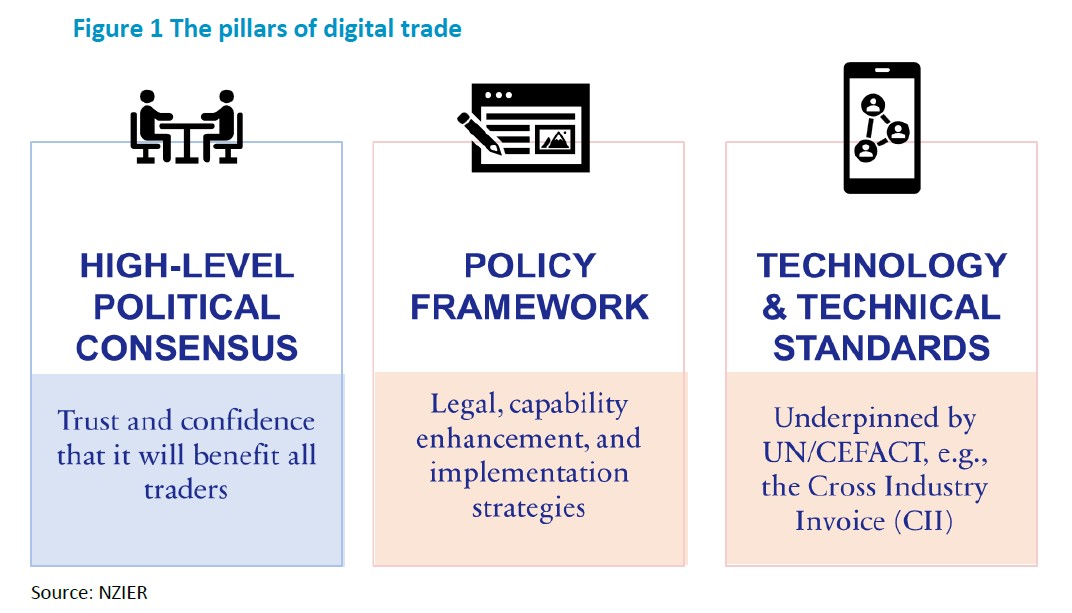
New Zealand Institute of Economic Researches (NZIER) has investigated what is needed to drive and develop a paperless trade environment for government and non-government supply chain participants.
The gains from introducing paperless trade are significant to the point where they potentially match a high-quality trade agreement that delivers benefits year-on-year (NZIER 2021). The gains are driven by the reduction in transaction costs associated with trade documentation, that is, a move from a paper-based system to a paperless system associated with imports and exports. This prize is well worth the re-organisation required to implement the system.
This report sets out the building blocks for a paperless trade international ecosystem, scans New Zealand businesses to understand further details that inform the expected costs and benefits (see Appendix A) and examines what it might take to successfully implement a paperless trade environment. Specifically, it focuses on:
- Doing better. Paperless trade is coming, New Zealand will need to ensure that it is able to capitalise on the benefits and mitigate costs.
- Being proactive. The development of coalition(s) of the willing can demonstrate to the world that paperless trade is workable. This will require a high degree of trust, interoperability, and an alignment of semantics and standards, which have not been seen before. The degree of coordination means that New Zealand is reliant on trade partners to play their part in making paperless trade work.
A degree of ‘top-down’ encouragement from a ‘coalition of the willing’ will be required to ensure that ‘bottom-up’ solutions are developed in a timely fashion. While paperless trade does not have all the characteristics of a disruptive technology, it will create winners and losers including in the public service.
Realising the gains from paperless trade will require political commitment and direction
Piecemeal approaches to electronic infrastructure development may not move New Zealand into a more efficient and effective connection with our trading partners as quickly as desired from a New Zealand Inc. perspective.
This is more likely to be achieved if we follow international best practice:
- UN ESCAP (2018) suggests that a single government agency needs to control and direct the full implementation of paperless trade initiatives.
- Creation of a formal coordinating group of stakeholders to provide feedback on the development of paperless trade developments.
- Utilise other best practice approaches, such as international standards that are already in place.
A broader-based group of trading entities
Paperless trade offers an opportunity to make exporting easier for all who wish to participate. Most firms in New Zealand are micro, small and medium-sized businesses and small and medium-sized entities.
Encouraging more export participation from these entities will diversify New Zealand’s trade offering, create conditions for further innovation, and lead to a broader increase in economic well-being.
As a trader with the world, distant from markets and lacking in scale, New Zealand needs to use all the advantages of its people to generate wealth. Paperless trade is one way of making the trading process easier.
Paperless trade does, however, require the re-organisation of a firm’s back office and some capital investment. For small and medium-sized firms, this is a large cost.
Taking this approach unlocks the benefits
The benefits of paperless trade are well known. International (UNCTAD 2020a; ESCAP, n.d.; ICC 2023a) and domestic; New Zealand Customs Service 2022) studies point to the significant gains from paperless trade. With trade agreement prospects constrained by the current international situation, getting more out of existing trade agreements is one way to sustain economic growth over the long term.
The benefits of paperless trade can be as much as 20% of the logistics costs and have the potential to drive innovation, particularly but not exclusively in perishable products. These benefits are akin to a high-quality free trade agreement.
Source: New Zealand Institute of Economic Researches (NZIER)
